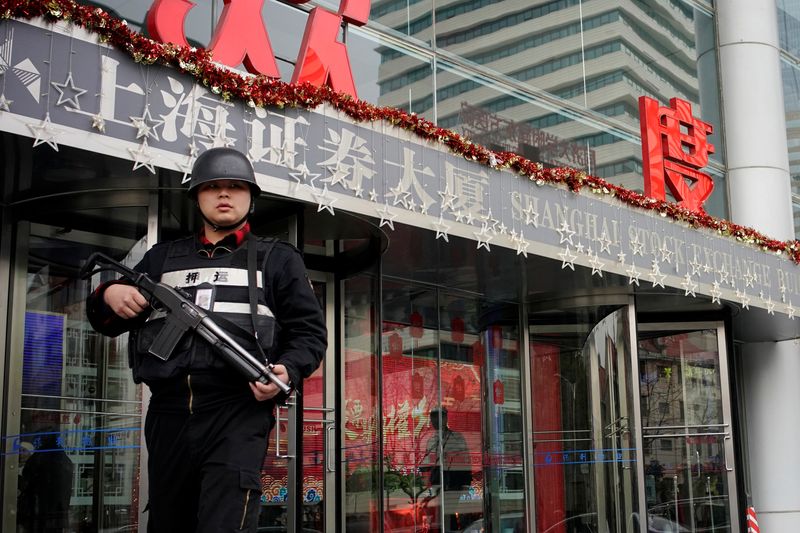By Jason Xue and Tom Westbrook
(Reuters) - Chinese stock investors are ploughing money into exchange-traded funds (ETFs) this year at the fastest pace on record as they choose to play a languid stock market passively and wait for it to trough.
The trend has also caught on as active fund managers in China struggle to make money and as Beijing uses ETFs to support stock markets and channel funding into strategic sectors such as technology and green energy.
ETFs, which are funds that typically track an index, have garnered more than 400 billion yuan ($55.97 billion) this year in what would be record annual net inflows, according to mutual fund house China Asset Management Co (ChinaAMC), which has the biggest market share in the products.
"When the market falls, many investors would use ETFs to bet on a bottom," said Xu Meng, executive general manager of quantitative investment at ChinaAMC, which emulates global ETF giants Vanguard and BlackRock (NYSE:BLK) iShares.
In contrast, active equity and allocation funds have suffered net outflows of roughly 360 billion yuan, as investors "have been looking for better value propositions in ETFs," said Morningstar senior analyst Andy Huang.
An index tracking China's active equity funds has slumped roughly 12% so far this year as the country's post-pandemic economic recovery struggles for traction. That compares with a 1.9% fall in the benchmark Shanghai Composite Index.
"I have been gradually exiting active funds, and swapping into ETFs," said retail investor Simon Zhang, who was disillusioned by active fund managers' underperformance.
Total assets under management (AUM) at China's stock ETFs jumped 33% during the Jan-Sept period to 1.48 trillion yuan, while active equity funds' AUM dropped 13% to 3.9 trillion yuan, according to fund consultancy Z-Ben Advisors.
CENTRAL HUIJIN
The popularity of ETFs has risen after China's sovereign wealth fund Central Huijin Investment started buying blue-chip ETFs in late October to stabilise the wobbly stock market.
Ben Charoenwong, assistant professor of finance at the National University of Singapore (NUS) Business School, said China can also use ETFs to channel money into innovative and small companies that "may be deprived of crucial capital to survive" in a sluggish economy.
Last week, Shanghai Stock Exchange head Cai Jianchun told an ETF forum that indexes are the "baton" of money flows, and index investing must better serve the central government's quest for technological independence.
In testament to such efforts, funds tracking China's tech-focused STAR50 index have exceeded 145 billion yuan, while money being funnelled into state-owned sectors via ETFs has also jumped, the bourse said.
Competition is getting fierce in a market crowded with more than 50 ETF players such as E Fund Management Co and Huatai-PineBridge Investments, but ChinaAMC's Xu said the sector has room to grow.
Since beating the market in China is getting increasingly tough, "passive investment will likely outpace active investment in China over the next three to five years at least", he said.
(This story has been corrected to fix the figure to 360 billion yuan in paragraph 5)
($1 = 7.1463 Chinese yuan renminbi)
